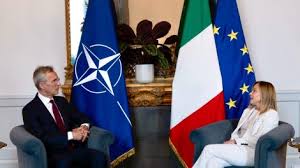Italy urges NATO southern focus and UN reform

Rome: NATO’s southern focus. In light of inauguration of the 75th NATO summit in Washington, Italian Defence Minister Guido Crosetto has called for a greater focus on the Southern Front and the reform of the United Nations Security Council (UNSC) to tackle global challenges.
Italy urges allies to prioritise the Mediterranean region, which has become a potential conflict zone due to rising tensions.
Minister Crosetto emphasised that global security is increasingly threatened by autocratic regimes prioritising force over international law. Upon his arrival in Washington, he stated that this was unacceptable and Italy is dedicated to strengthening supranational organisations.
He also highlighted the need for a stronger UN, as cross-vetoes have hindered it recently.
Southern flank urgency. Minister Crosetto emphasised the importance of the Eastern Front, where Italy aided Ukraine after the Russian invasion. However, he also stressed the significance of the Southern Front.
He declared that the Southern Front was just as crucial and potentially dangerous as the Eastern Front. He also added that NATO must pay attention to this area, although it seems they may have overlooked it.
At last month’s Defence Ministerial meeting at NATO headquarters in Brussels, Minister Crosetto reiterated the need for a dedicated organisation to address the Southern flank and urged immediate action to prevent further escalation.
This aligns with Italy’s Mattei Plan, which aims to foster economic development and stability in Africa and solidify Italy’s role as a leading partner in the region.
Revamping global governance. Furthermore, advocating for a more democratic and effective United Nations Security Council is one of Italy’s foreign policy objectives.
Minister Crosetto stated, “Cross vetoes hinder the UN. However, we must establish an international platform to discuss peace and international laws.”
Italy is leading the “Uniting for Consensus” group, which proposes a reform project to improve regional representation and ensure a fairer distribution based on geography.
Under this plan, Africa would gain six seats, Asia-Pacific would gain five seats, Latin America and the Caribbean would gain four, and Western and Eastern Europe would gain three and two, respectively.
The proposal also intends to eliminate the addition of permanent seats with veto powers, emphasising the need for a more accountable and representative Security Council.





